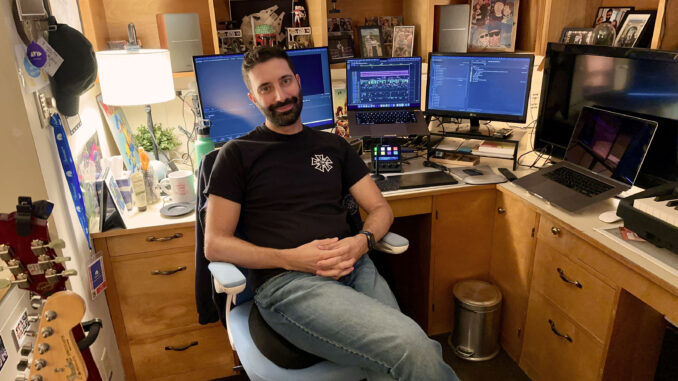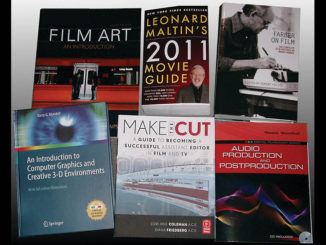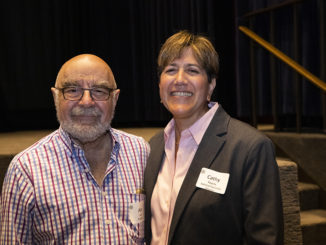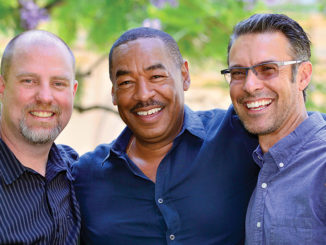
Where are you currently employed?
Currently at Titmouse Animation.
Current projects?
An unannounced animated adult comedy for Netflix.
Describe your job.
In the animation medium, an animatic is the roughed-out, usually black-and-white blueprint of a TV program before it’s animated. Directors and storyboard artists draw characters in key poses, choosing the camera angles and action along with pre-recorded dialogue from the script. As an animatic editor, I build the animatic from storyboard sequences and audio typically edited by a separate dialogue editor. I’ll start by doing general timing edits, which involves choosing the pacing of the dialogue and action and filling out temporary sound design and music scoring as needed.
The animatic phase is where we do the bulk of our pacing, whether for comedy, action, or drama, and swap out different takes of dialogue as needed. It’s very collaborative, and it’s fun to try and figure out how to use the tools in your toolbox to manipulate images and sound to make things work in ways they likely could not with live-action footage. I’ve developed a unique set of skills for this workflow that I was never exposed to in the live-action world, such as removing breaths from dialogue to speed-up an actor’s natural takes.
How did you first become interested in this line of work?
I did not come to Los Angeles to pursue editing; I initially wanted to be a comedy writer. My first exposure to editing was in a high school film studies class where we would shoot and edit projects using iMovie. In college, I continued using iMovie to edit photo slideshows to music, which I didn’t even realize was editing. This led me to a post-production class where I was exposed to Avid, Apple’s Final Cut, and Adobe’s After Effects, Photoshop, and Illustrator. I took to these programs and started volunteering to edit projects, whether they were a part of my TV production classwork or not.
After I moved to LA, I had some success picking up small freelance editing gigs. Once I started doing more editing/postproduction work, I realized how much I loved doing it and shifted my goal toward becoming an editor.
Who gave you your first break?
I credit several people for giving me a collective first break during my first year in LA. One was a director for whom I did freelance visual effects. I was excited to apply my basic After Effects knowledge and develop that skill set on a small project. The director loved my work and gave me more things to do, including hiring me as a PA for a pilot he was working on. I got a lot of great hands-on experience that enabled me to get direct feedback from a creative professional and also from working on a low-budget film shoot.
My other “break” was when I was brought on as an editing intern for a music documentary, thanks to Guild member and accomplished editor Ishai Setton. Ishai was a great early mentor who taught me important basics of Final Cut Pro and how to organize a project and sequences in an unscripted environment.
What was your first union job?
I technically worked one month on an un-scripted union gig, “Project Runway: Threads,” which was Project Runway but with kids. However, I wasn’t employed long enough to join the union. That didn’t happen until years later, when I started an animation gig. A few editors pulled me aside and said they were about to speak with [Guild organizers] Rob [Callahan] and Preston [Johnson] about flipping the company’s editorial team to union. From there, I was fully on board and have been a union member ever since.
What credits or projects are you proudest of, and why?
“Frog and Toad.” I not only received two Emmy nominations alongside the animatic editors, but this was one of the most rewarding and fulfilling shows I’ve ever worked on. Everyone involved had such passion for the characters and, from the top down, the crew took a lot of pride in keeping the show true to the tone of the Arnold Lobel stories.
When I was brought on, it was clear I would be respected for my talent and creative input. This show was where I hit my stride as an animation editor, feeling a sort of mastery over both the timeline and storytelling. I was honored and delighted to be treated as an integral part of the creative team.
Once the show was finally released, I was able to show my kids, which is an incredibly humbling and exciting experience as a parent of young children.
What was your biggest challenge in your job (or on a particular project) and how did you overcome/solve it?
When I was working on the show “Animals” on HBO, I was tapped to edit some live-action segments in addition to the daily tasks I had of editing and reviewing animation retakes and facilitating other pieces of the final post-production pipeline.
While I was very excited to cut scripted live action, which I hadn’t professionally done yet, it was clear after the first couple of weeks that I just did not have the mental bandwidth or time to handle this additional responsibility.
I shared my concern with the producer, who understood and hired another editor to work on the live-action segments.
While it felt like I was “giving up” on a part of the job that was asked of me, I felt proud that I’d learned how to speak up for myself and accept my creative limits at that time. In the long run, it was the best thing for the show.
What was the most fun you’ve had at work?
I can’t think of a particular moment, but I love premieres and parties, lunches, after-work outings, etc. Anytime you can bond with your co-workers and let loose a little bit is important not only for crew morale, but for your mental health and to create friendships.
During working hours, it’s always extra-exciting to attend audio recording sessions and mixes. Watching an actor record lines, then later working with those recordings and remembering what it was like in the room, was a great way to learn about that process and to further understand production audio. I also love going to mixes at the final stages because it’s enjoyable to watch other types of editors in their environment.
Jobwise, what do you hope to be doing five years from now?
I honestly love doing what I’m doing, and I hope I’ll still be doing it in five years. Right now, I feel I’m on the cusp of a career point where less-experienced editors in my field look to me for advice or as an example. In that respect, I hope to continue to pay it forward and fight for better wages, recognition, and exposure to animation editing and the animation field in general.
What are your outside activities, hobbies, passions?
I’ve loved music and sports my whole life. I started piano at age five and picked up the trumpet and guitar along the way. I played in jazz and concert bands in high school, and with two friends, I started an instrumental rock band that played local shows in my hometown. We even recorded two albums at real studios, which probably helped spur my later career interests. I still play and (slowly) collect guitars and gear, and I occasionally write and record my own music. I love going to concerts, too.
I loved playing basketball as a kid and always wished I had been a little better than I was. I grew up around Boston in the late ‘90s/early 2000s when the Red Sox, Patriots, and Celtics all had championship runs, so I’m a pretty dedicated Boston sports fan, despite not dropping my “r’s” and saying “wicked” all the time.
Favorite movie(s)? Why?
I have always struggled to pick something other than the popular choices; “Star Wars,” “Lord of the Rings,” and “Back to the Future” all come to mind.
I’m a huge comedy fan, so if I had to pick a non-franchise movie, it would probably be “Monty Python and the Holy Grail.” Moments from that movie frequently play in the back of my mind, and it can be fun to drop a line or two when it’s appropriate — or better yet, inappropriate.
Favorite TV program(s)? Why?
Comedies – “The Office” and “Arrested Development” were primary influences in my initial goal to be a comedy writer. I had the opportunity to intern for a semester on “The Office” when I did an internship program in LA before I graduated college. It was an amazing opportunity to see a show at its peak in full production, and I also made some great connections.
Dramas – “Breaking Bad,” “Mad Men,” “The Wire.” I love the “prestige TV” type of storytelling where you spend years with characters as they develop throughout a series.
Do you have an industry mentor?
Getting started as an assistant editor in animation, I learned very quickly and efficiently from my first few editors: Kris Fitzgerald, Luke Guidici, and Robert Anich. Each had their own way of taking me under their wing or pushing me to learn the necessary tools to get to the editing chair.
What advice would you offer to someone interested in pursuing your line of work?
Learn as much as possible about the craft and how to “operate the machinery.” Learn the basics and how each software program executes them.
Practice by shooting your own home movies, downloading stock footage, drawing your own stick figures, recording your own voiceover narration or dialogue — whatever you need to be around audio and visuals so you can get a feel for, and be comfortable in, the editing environment.
I also love preaching about making your workflow more efficient — hot keys, keyboard shortcuts, macros, anything you can do to speed up any frequently used or repetitive tasks. Once that stuff becomes muscle memory, you’ll never want to go back.
When you get a chance to be on a project in an assistant or apprentice role, observe and absorb as much as you can from the editor, especially during editing sessions. These are things you can’t learn in school; it’s about feeling out the creative instincts of whomever you’re working with and eventually learning when and where to provide your input.
Was there ever a circumstance when you had to rely on the Guild for help or assistance?
During the basic negotiations of 2021, when we had authorized a strike and the IATSE was about to pull the trigger, I had to reach out to my field rep Olie to help navigate an interesting political situation. Working under a singular contract between the Guild and my employer at the time, we were not expected to strike if/when the IA did. However, the company’s leadership was unaware that an IATSE-wide strike would not affect us. Olie had been saying we’re not expected to strike, I told my production I would still be working, but leadership was confused, and eventually the company’s president emailed me directly. Because of his request, I cordially provided him with Olie’s information, and they discussed the situation on the phone.
Is there anything you’d like to say to your fellow Guild members, some words of encouragement?
I know times are tough and a lot of you are not working. I feel for everyone and hope things get better soon. What I love about this community is the passion I see for the craft. Even in tough times, getting to talk one-on-one with another editor about these passions is inspirational. I hope we continue to do that even when the work runs dry. We are a brilliant, talented, magical set of people who help craft and tell stories the whole world gets to see, enjoy, critique, and share with their loved ones. That’s not something we should ever take for granted.





